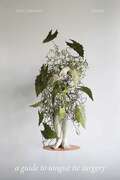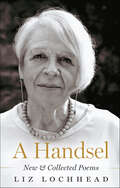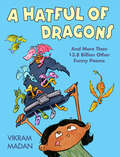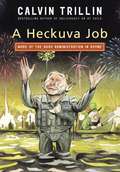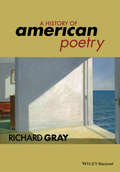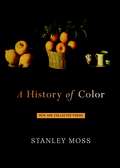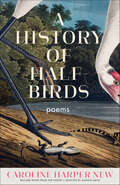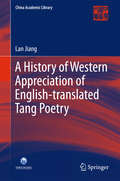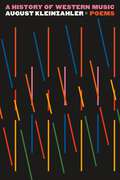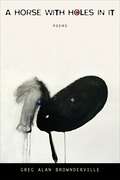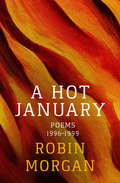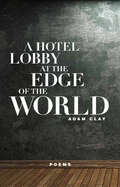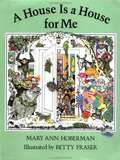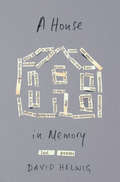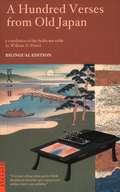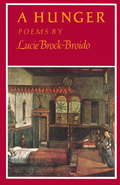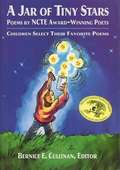- Table View
- List View
A Guide to Tongue Tie Surgery: Poems (Mary Burritt Christiansen Poetry Series)
by Tina CarlsonA Guide to Tongue Tie Surgery gives voice to abused children, murdered women, research animals, war veterans, and even metronomes and lampshades. In poems inspired by Ovid, Tina Carlson explores the roots of voicelessness and journeys into metamorphosis, granting speech to those ignored or victimized and thereby allowing them to provide witness to their own lives.
A Handful of Beans
by William Steig Jeanne SteigFrom the beloved children's book duo, Jeanne and William Steig, comes six classic fairy tales retold with a refreshing twist that will keep you laughing from beginning to end!"Is it Crumple or Blister, or Guggle or Nank? Williwaw, Flimflam, or Hiccup or Clank?" Says the Queen to Rumplestiltskin, of course! In this delightfully odd and sublime collection of six classic fairy tales, Jeanne and William Steig put a quirky twist on "Rumplestiltskin," "Beauty and the Beast," "Hansel and Gretel," "Little Red Riding Hood," "The Frog Prince," and "Jack and the Beanstalk." Retold in illustrated verse, A Handful of Beans is a wry and highly amusing take on the tales you thought you knew.
A Handsel: New & Collected Poems
by Liz LochheadLiz Lochhead is one of the leading poets writing in Britain today. Her debut collection, Memo for Spring (1972), was a landmark publication. Writing at a time when the landscape of Scottish poetry was male dominated, hers was a fresh, new voice, tackling subjects that resonated with readers – as it still does. Her poetry paved the way, and inspired, countless new voices including Ali Smith, Kathleen Jamie, Jackie Kay and Carol Ann Duffy. Still writing and performing today, more than fifty years on from her first book of poetry, Liz Lochhead has been awarded the Queen's Gold Medal for Poetry and was Scotland's second modern Makar, succeeding Edwin Morgan.
A Hatful of Dragons: And More than 13.8 Billion Other Funny Poems
by Vikram MadanKirkus Reviews Best BookTexas Bluebonnet 2021-2022 Master ListNew York Public Library Best BookDenver Public Library&’s Best and Brightest 2020 Poetry ListALSC Summer Reading SelectionSouth Dakota Prairie Bloom Award FinalistIdeal for fans of Jack Prelutsky and Shel Silverstein, this collection of hilarious poems is perfect for any young reader who likes to read — and laugh!This funny poetry book is full of unusual characters: panda and pangolin musicians, mail-order eggs that hatch dinosaurs (surprise!), ten aliens with a garden-gnome pal, a robot uncle, lots and lots of dragons, and a professor who uses his Page Machine to travel to multiple pages within the book. Vikram Madan's ingenious poems take many forms, from limerick to rebus to a fill-in-the-blank poem that offers more than 13.8 billion funny combinations. All feature clever wordplay, impeccable rhythm and rhyme, and riotous punchlines. This is a quirky collection of poems that readers will laugh their way through again and again.
A Heckuva Job: More of the Bush Administration in Rhyme
by Calvin TrillinTrillin deals with the people around Bush, such as Nanny Dick Cheney, Mushroom Cloud Rice and many others. He tries to predict the behavior of the famously hot-headed John Bolton as ambassador to the United Nations in poems.
A Historical Guide to Walt Whitman
by David S. ReynoldsPlaces the author and his thinking in its historical context. One of a series on well-known authors.
A History of Afro-American Literature: Volume I The Long Beginning 1746-1895
by Blyden JacksonA careful analysis of Afro-American literary contributions.
A History of American Poetry
by Richard GrayA History of American Poetry presents a comprehensive exploration of the development of American poetic traditions from their pre-Columbian origins to the present day. Offers a detailed and accessible account of the entire range of American poetry Situates the story of American poetry within crucial social and historical contexts, and places individual poets and poems in the relevant intertextual contexts Explores and interprets American poetry in terms of the international positioning and multicultural character of the United States Provides readers with a means to understand the individual works and personalities that helped to shape one of the most significant bodies of literature of the past few centuries
A History of Color: New and Selected Poems
by Stanley MossFew poets today, even very good ones, write lines, as Stanley Moss does, that are so exquisitely crafted you cannot help but remember them. "What is heaven but the history of color," begins the new long poem after which this book is named. "We know at ninety sometimes it aches to sing," begins another poem, for a woman upon her ninetieth birthday. In the hands of this master, "Ah who art in heaven," transmigrates to the quieting "ah, ah, baby." And here is Moss in an early poem: "I've always had a preference / for politics you could sing / on the stage of the Scala," ending that poem with words attributed to Lincoln: "I don't know what the soul is, / but whatever it is, I know it can humble itself." A History of Color: New and Collected Poems by Stanley Moss is the first one-volume, complete edition of the poetry of this important living American poet. A History of Color proposes poetry that is made to be useful. Moss is our leading psalmist. Metaphors for wonder abound, his language one of sorrow and exaltation.
A History of Half-Birds: Poems
by Caroline Harper NewSelected by Maggie Smith for the 2023 Ballard Spahr Prize for Poetry, this debut collection of poems explores the aftermath of history’s most powerful forces: devotion, disaster, and us.Rooted in the Gulf Coast, A History of Half-Birds measures the line between love and ruin. Part poet, part anthropologist, Caroline Harper New digs into dark places—a cave, a womb, a hurricane—to trace how violence born of devotion manifests not only in our human relationships, but also in our connections to the natural and animal worlds. Everywhere in these pages, tenderness is coupled with brutality: a deer eats a baby bird, a lover restrains another. “I promised / a love poem,” New proclaims, then teaches us about the anglerfish, how it “attracts its mate / and prey with the same lure.”In New’s exceptional voice, familiar concepts take on a shade of the fantastic. A woman tastes the earth for acidity, buries lemons and pennies for balance. Limestone “sucks the sea / into little demitasse” and hyacinths “sip the sun / black.” A lone elephant wanders into the wilderness of rural Georgia, never to be seen again. But perhaps most arresting about New’s work are the truths told by its strangeness, like the ancient fish who “carved their shape” in a mountain’s peak, or a mother who wears a lifejacket in the bathtub.Crafted by New’s voracious mind and carried by her matchless lyricism, A History of Half-Birds is a stunning investigation of love’s beastly impulses—all it protects, and all it destroys.
A History of Indian Poetry in English
by Rosinka ChaudhuriA History of Indian Poetry in English explores the genealogy of Anglophone verse in India from its nineteenth-century origins to the present day. Beginning with an extensive introduction that charts important theoretical contributions to the field, this History includes extensive essays that illuminate the legacy of English in Indian poetry. Organized thematically, these essays survey the multilayered verse of such diverse poets as Henry Louis Vivian Derozio, Rabindranath Tagore, Nissim Ezekiel, Dom Moraes, Kamala Das, and Melanie Silgardo. Written by a host of leading scholars, this History also devotes special attention to the lasting significance of imperialism and diaspora in Indian poetry. This book is of pivotal importance to the development of Indian poetry in English and will serve as an invaluable reference for specialists and students alike.
A History of Modernist Poetry
by Alex Davis Lee M. Jenkins Davis, Alex and Jenkins, Lee M.A History of Modernist Poetry examines innovative anglophone poetries from decadence to the post-war period. The first of its three parts considers formal and contextual issues, including myth, politics, gender, and race, while the second and third parts discuss a wide range of individual poets, including Ezra Pound, T. S. Eliot, W. B. Yeats, Mina Loy, Gertrude Stein, Wallace Stevens, William Carlos Williams, and Marianne Moore, as well as key movements such as Imagism, Objectivism, and the Harlem Renaissance. This book also addresses the impact of both World Wars on experimental poetries and the crucial role of magazines in disseminating and proselytizing on behalf of poetic modernism. The collection concludes with a wide-ranging discussion of the inheritance of modernism in recent writing on both sides of the Atlantic.
A History of Twentieth-Century American Women’s Poetry
by Linda A. KinnahanA History of Twentieth-Century American Women's Poetry explores the genealogy of modern American verse by women from the early twentieth century to the millennium. Beginning with an extensive introduction that charts important theoretical contributions to the field, this History includes wide-ranging essays that illuminate the legacy of American women poets. Organized thematically, these essays survey the multilayered verse of such diverse poets as Edna St Vincent Millay, Marianne Moore, Anne Sexton, Adrienne Rich, and Audre Lorde. Written by a host of leading scholars, this History also devotes special attention to the lasting significance of feminist literary criticism. This book is of pivotal importance to the development of women's poetry in America and will serve as an invaluable reference for specialists and students alike.
A History of Western Appreciation of English-translated Tang Poetry (China Academic Library)
by Lan JiangThis book examines the development of English-translated Tang poetry and its propagation to the Western world. It consists of two parts, the first of which addresses the initial stage of English-translated Tang poetry’s propagation, and the second exploring its further development. By analyzing the historical background and characteristics of these two stages, the book traces the trend back to its roots, discusses some well-known early sinologists and their contributions, and familiarizes readers with the general course of Tang poetry’s development. In addition, it presents the translated versions of many Tang poems.The dissemination of Tang poetry to the Western world is a significant event in the history of cross-cultural communication. From the simple imitation of poetic techniques to the acceptance and identification of key poetic concepts, the Tang poetry translators gradually constructed a classic “Chinese style” in modern American poetry. Hence, the traditional Chinese culture represented by Tang poetry spread more widely in the English-speaking world, producing a more lasting impact on societies and cultures outside China – and demonstrating the poetry’s ability to transcend the boundaries of time, region, nationality and culture.Due to different cultural backgrounds, the Tang poets or poems admired most by Western readers may not necessarily receive high acclaim in China. Sometimes language barriers and cultural differences make it impossible to represent certain allusions or cultural and ethnic concepts correctly during the translation process. However, in recent decades, the translation of Tang poetry has evolved considerably in both quantity and quality. As culture is manifested in language, and language is part of culture, the translation of Tang poetry has allowed Western scholars to gain an unprecedented understanding of China and Chinese culture.
A History of Western Music: Poems
by August KleinzahlerIn a career-spanning selection of poems, August Kleinzahler captures the essence of the West's greatest music.In A History of Western Music, August Kleinzahler’s rhythmic, wry, kinetic style captures the ineffable power and beauty of great songs and artists, as well as the potency of our response to them. In this collection, music is inextricable from life, from landscape, and from the people we remember through it. The poet inhabits the minds and milieus of musicians; he hears arpeggios in the salon of Princesse Edmonde de Polignac and listens to the vibrations of a hummingbird through Béla Bartók. Kleinzahler’s verse not only contains the same sonorous beauty as the compositions he writes of but also the vitality and complexity of the moments we associate with them—the way the soundtrack of one’s life becomes defined by the scenes it scores, and vice versa.From John Coltrane to Annie Lenox, from opera to bebop and all the jingles and melodies in between, A History of Western Music is a portrait of the vast range of meaning and memory that music creates and contains in one’s life.
A Horse with Holes in It: Poems (Southern Messenger Poets)
by Greg Alan BrowndervilleA Horse with Holes in It, Greg Alan Brownderville’s third collection of poetry, employs inventive phrasing and vivid imagery to construct a particular life marked by religion, confused by desire, dulled by alcohol, and darkened by death. But Brownderville also skillfully uses humor to soften the disquieting images that haunt these stanzas. Strange stories wind through these poems: Two method actors live as lovers in a wartorn city and take the stage in an empty playhouse. A poet confesses to killing thousands of Arkansas blackbirds via folk magic. A preteen boy, deeply involved in an underground religion, is pressured into marrying a dangerous demon. Brownderville’s poems examine a soulscape wrecked almost beyond recognition and dig deeply through the ruins.
A Hot January: Poems 1996–1999
by Robin MorganCelebrated for her exquisitely crafted poems revealing an alternate female reality, award-winning poet and bestselling author Robin Morgan gives us, in this fifth collection, her most intimate work yet The poems gathered here trace a stunning spectrum of love, betrayal, loss, pain, rage, and survival. Skirting madness in the wake of a tempestuous relationship&’s end, these poems slice language with knife-edge bitterness, but within the deliberate constraints of form. Individual poems have become famous: &“Add-Water Instant Blues&” is the most anthologized; &“Cave Dwellers&” and &“Acrobats and Clowns&” have been widely translated; and the various &“disguised,&” subtle sonnet forms throughout the book have been used to teach the art of writing poetry. Art itself becomes the healing theme, and a number of the poems here are in dialogue with other poets, including Marianne Moore, Audre Lorde, Adrienne Rich, Muriel Rukeyser, Christopher Marlowe, John Donne, William Blake, and Robert Graves. The wise voice that emerges dares celebrate a quiet joy, tempered only by fire.
A Hotel Lobby at the Edge of the World: Poems
by Adam Clay“At the edge of the world, you’ll want to have this book. The final lines of Adam Clay’s poem, ‘Scientific Method,’ have been haunting me for weeks.” —Iowa Press-CitizenThe distilled, haunting, and subtly complex poems in Adam Clay’s A Hotel Lobby at the Edge of the World often arrive at that moment when solitude slips into separation, when a person suddenly realizes he can barely see the place he set out from however long ago. He now sees he must find his connection back to the present, socially entangled world in which he lives. For Clay, reverie can be a siren’s song, luring him to that space in which prisoners will begin “to interrogate themselves.”Clay pays attention to the poet’s return to the world of his daily life, tracking the subtly shifting tenors of thought that occur as the landscape around him changes. Clay is fully aware of the difficulties of Thoreau’s “border life,” and his poems live somewhere between those of James Wright and John Ashbery: They seek wholeness, all the while acknowledging that “a fragment is as complete as thought can be.” In the end, what we encounter most in these poems is a generous gentleness—an attention to the world so careful it’s as if the mind is “washing each grain of sand.”“Poems that are in turn clear and strange, and always warmly memorable.” —Bob Hicok“These poems engage fully the natural world . . . even as they understand the individual’s exclusion from it.” —Publishers Weekly
A House Is a House for Me
by Mary Ann HobermanLists in rhyme the dwellings of various animals and things.
A House in Memory: Last Poems (Hugh MacLennan Poetry Series #52)
by David Helwig"the language of the waterway / the name / the train's route through bliss / to" When the poet and novelist David Helwig - a recipient of the Matt Cohen Prize for lifetime achievement and a member of the Order of Canada - died in October 2018, he left behind a substantial catalogue of unpublished work. A House in Memory, a selection of Helwig's last poems, was assembled by his daughter, Maggie. It shows an author still at the height of his powers, creating work in complex formal structures, contemplating mortality, memory, and the landscape of his adopted home of Prince Edward Island, and paying tribute to his literary predecessors. The collection also includes unpublished poems from earlier in Helwig's career. Ranging widely through time, space, and literary tradition, A House in Memory features some deeply personal poems. As Maggie Helwig says of her father, "he could not cease to be a poet as long as he had breath in this world.
A Hundred Verses from Old Japan
by William N. PorterA Hundred Verses from Old Japan, being a translation of the Hyaku-nin-isshiu, was originally collected in the thirteenth century. One of the most popular anthologies of Japanese classical poetry, this collection comprises love poems and "picture poems" describing scenes from nature in tanka form, thumbnail sketches compressed into thirty-one syllables.
A Hundred Verses from Old Japan
by William N. PorterA Hundred Verses from Old Japan, being a translation of the Hyaku-nin-isshiu, was originally collected in the thirteenth century. One of the most popular anthologies of Japanese classical poetry, this collection comprises love poems and "picture poems" describing scenes from nature in tanka form, thumbnail sketches compressed into thirty-one syllables.
A Hunger
by Lucie Brock-BroidoRanging from the mundane to the ethereal, the themes of Brock-Broido's first collection are interesting and sometimes startling. The poems range from those concerned with time, especially the conjunction of the past and the future; those influenced by things or places specifically American, poems that appear vaguely autobiographical; and those based on actual historical or contemporary events, usually involving, and often narrated by, a child.
A Jar of Tiny Stars
by Bernice E. CullinanA sample of poems by poets who have received the National Council of Teachers of English Award for Poetry for Children, including David McCord, Aileen Fisher, Karla Kuskin, Myra Cohn Livingston, Eve Merriam, John Ciardi, Lilian Moore, Arnold Adoff, Valerie Worth, and Barbara Esbensen.
